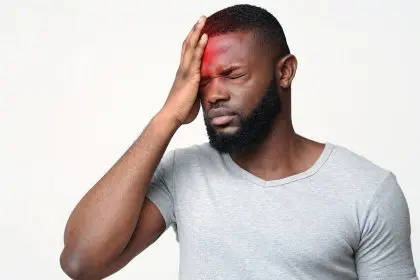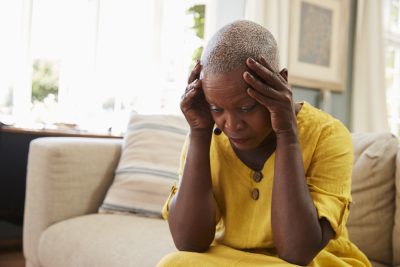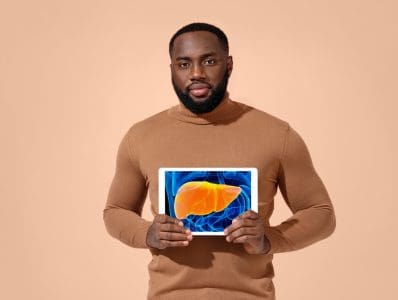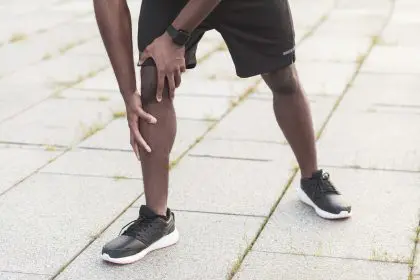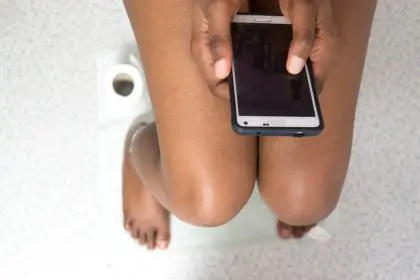Dr. Burnetta Herron is a general surgeon at Sinai Chicago Hospital. A Chicago native, she has more than 25 years of experience in the medical field. Rolling out publisher Munson Steed spoke with Dr. Herron during Breast Cancer Awareness Month about the importance of routine checkups — to prevent the disease or intervene in its early stages. Her insights underline the pivotal role of regular screenings in safeguarding women’s health.
What motivated you to become a doctor?
Well, my mother was a high school chemistry teacher. She was big on education and science, and she instilled in my brother and me this fervor for science. … Once I decided to become a physician, the first time I walked into the operating room and saw a big open abdomen — because I do abdominal surgery as well — I just was hooked. So that’s where that became my goal and passion in life.
Why should young students, and women in particular, consider going into the health field?
One of the most important things is bringing back, “Taking a village to grow.” Our community needs that village in a lot of different ways, and a lot less traditionally than what we grew up thinking those words meant. Whether it be an educator, a surgical scrub tech, a nurse, a doctor, a researcher, a patient advocate, a community health worker, or whatever that might be within health sciences, I think anything that can help improve our health as a community helps our population as well. … Where the caregiver is the same ethnicity or culture as the patient, [it] markedly improves [patient] outcomes. So, we need more of us in medicine, in any regard that might be.
What’s the key to getting women in to see the doctor at least three to four times a year?
I think first, it’s really important to find the right person that you feel like you can trust, and if you have questions, or feel uncomfortable in that visit with your physician or caregiver, then find somebody else. There are people there that can help and listen. I know sometimes that seems like a big task. “Where do I go next?” or “I’ve had this person for a while,” but if you feel uncomfortable with them to the point where you’re not wanting to go, or you’re not going, or you’re not feeling comfortable with the recommendations, then I think it’s time to find an organization, a person, a place that you feel comfortable. Or at the very least express those concerns to the person who’s helping, who’s trying to help.
How do you encourage those at risk, a woman whose mother had breast cancer, to get a mammogram early?
A lot of those issues begin with fear of the unknown [and] fear of the known from what they’ve been through. … In a lot of cases, instead of causing someone to rush in and get preventive care, a lot of people kind of shrink into themselves in a way, not wanting to be bothered with doctors, and again [it’s] because of a lack of trust. It’s just very important that we understand that we have things available to us.
Why are Black women’s outcomes so much worse than White women’s?
Our women are not getting in to get their mammograms or other preventive care in a timely fashion. And what happens with that is, let’s say, like early-stage breast cancer. It’s very treatable. There’s a 99% survival rate. But we see a disparity where for White women, they will survive at a rate of 99%, but for Black women that’s 92%. If that cancer has spread regionally to the lymph nodes, for White women that survival rate is 85%. It is 72% for Black women. Then, for metastatic breast cancer, those numbers are even worse. For white women, it’s a 25% five-year survival rate. For Black women, it’s 15%. Part of the issue is a lack of trust in us, and that’s something that I’m hoping that we can continue to rebuild, because, although African American women are diagnosed with breast cancer at a lower rate, our outcomes are 40% worse. We have a lot of work to do.
Surgery often looks and feels drastic. How do you assure women that they can be whole, even after surgery?
A majority of breast cancers can be treated with what’s called breast-conservation therapy, which is just a lumpectomy. So, remove the area of abnormality through a small incision, smaller than your index finger, and sample lymph nodes in the armpit. It is not common for women to have mastectomies, which is removing the entire breast, which is why the screening is so important. By screening, we’re talking about mammograms at the appropriate age. For those women that may require a mastectomy, we do our best when appropriate to offer women what’s called “immediate breast reconstruction,” which means at the time of their surgery, if they have to have the breast removed, then they [also] will have a breast reconstructed by a plastic surgeon.
Then, when they wake up, all of that is done, they have the fullness in the chest, it’s a little less dramatic in terms of having to live through the scar and the loss of the breast. That’s really standard of care and something that should be available to you if you’re in that situation. We also have prosthetic bras that help in the interim, if somebody has a mastectomy and is unable to be a candidate to have the breast reconstructed immediately.
You mentioned “age-appropriate.” When should women start having mammograms?
Thank you so much for bringing that up. You’ll see a bunch of different agencies, the American College of Surgeons, American Society of Breast Surgeons, and the Association of Clinical Oncologists. Everyone has different time intervals, but I feel overall — and this is concordant with several of the national organizations — that mammograms should begin at the age of 40 and should be done every year.
They really shouldn’t stop. Sometimes they’ll say, “Oh, stop at the age of 70, 75!” Why? Our life expectancy is much beyond that, and it’s still very treatable for any age patient. So mammograms should start at age 40 and be done annually. You should also do a monthly self-breast exam, which just means getting used to what your breasts feel like. Don’t do it every day. If you do it every day, you might not notice little changes. It’s an opportunity to notice if there’s something different, and if there is, then you will talk to your physician about it.
What age is appropriate for somebody whose first-degree relative had breast cancer to have a mammogram?
Now, if you have a strong family history of breast cancer or even if it’s a first-degree relative, like mom, or sister, who had breast cancer, let’s say, at the age of 45, then you should start your breast imaging 10 years earlier than that person. So let’s say, for instance, if you had a first-degree relative who had breast cancer at 45, you’d start that imaging at 35 years old. We like to see women pretty much as soon as they start having their periods, and in their early 20s start their annual clinical breast exams with their doctors because we are seeing breast cancer at earlier ages, so we want an opportunity to intervene.
Why is it important to bring your support system with you if you get diagnosed with cancer?
Thank you again for asking some excellent questions. … Sometimes, once you hear the “C word,” the ears just close. There’s a lot of complicated terminology, and it seems rushed because we’re just trying to tell you what you need and start ordering to get those things taken care of. So having someone else be there is extraordinarily important.
I see patients come by themselves; they have no one with them. They might have young or young adult children, and they want to not tell them about it, or they’ve got a lot of issues going on in the family socially, and so they don’t want to “bother anyone.” They want to keep it all in, especially Black women. We keep so much in and take care of much, and it’s hard to ask for help, hard to receive help and it’s hard to know where to get the help when you need it. So it’s important to have somebody. I always encourage, no matter who it is, a friend, or family member to share because people always have a sense something is up. It’s too much to take on on your own and thank goodness we have a lot of resources like, for instance, the American Cancer Society.
Why should women share their family history with medical professionals?
There has been a tradition within our ethnicity of keeping secret medical history, our medical problems — and some of those are quite severe. We’re learning over time there’s a lot of genetic contribution to some medical problems. If we know these things early, we may be able to get more preventive care before a frightening diagnosis is given. …
I’m very a strong advocate and passionate about starting these conversations and education, about science and medicine and health in elementary schools, and high schools because those folks are going to go home and ask, “Mom, did you get your mammogram?” Or, “Today we saw this picture of this tumor. And wow. Do you know if anybody in our family’s ever had that?” So, start the conversations. It’s really there to help us.
How has our distrust of the medical community hurt us?
We tend with our distrust for medicine to not be involved with clinical trials because we feel like we’re being experimented on because, guess what? At one point, we were, right? So, it’s hard to let go of that and it makes sense to be fearful of that.
But it is fair also to say that distrust prevents us from being tested for things that may run in our family?
What I’m seeing is, for instance, we talk about BRCA1 and 2 — these are genes that increase the risk for breast cancer. So, we have blood tests for that. If we see people who’ve had, like many first-degree, or several first- and second-degree relatives, with breast and or ovarian or other cancers, it raises the antenna that there might be something within the family that is causing that.
So, we’ll send the patient for genetic screening … and also a blood test, if appropriate. If that blood test is positive, it means we have an opportunity. If somebody’s, let’s say your mother was diagnosed with breast cancer, then you’re a candidate and was positive for that gene. Then you’re a candidate. Be tested for that. But if you don’t know, you can’t get tested and get preventive care before breast cancer occurs. I will also say just because a person is positive for that gene does not mean they’re going to get breast cancer. But it means there’s an opportunity to act and think about these things ahead of time.
What surprises have you found as a result of this genetic testing?
What I’m seeing in practice is an extreme amount of young early 40s, late 30s, and beyond women getting breast cancer that we send for genetic testing. This is in the Black and Hispanic communities, and their genetic tests are completely negative. Yet, they’ll tell me they’ve had four aunts, two cousins, and a sister with breast or ovarian cancer, uterine cancer, and other cancers, over and over again. I see this [and say to myself], “There is something not right? Right?”
What we’re testing for genetically is not in this set of genetics here. If we were more open to medicine … we would be finding there are genetic issues of significance within alternate communities that we’re not testing for because we don’t have the evidence for it at this point.

